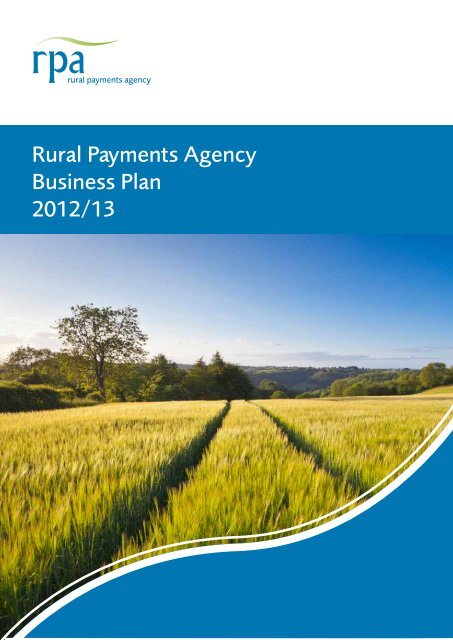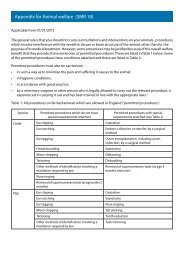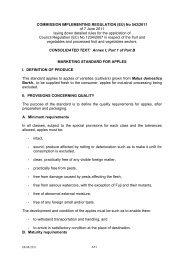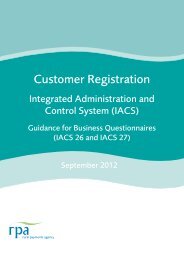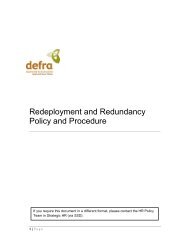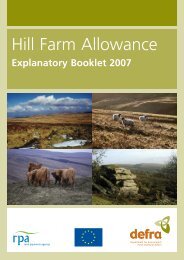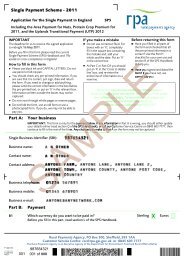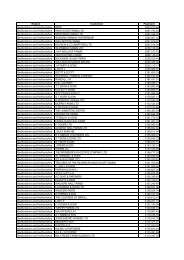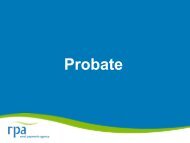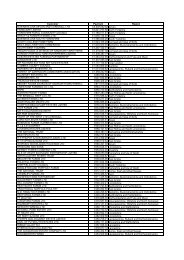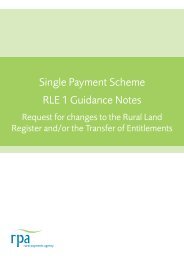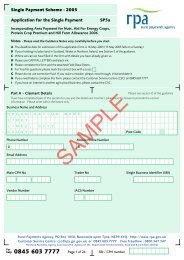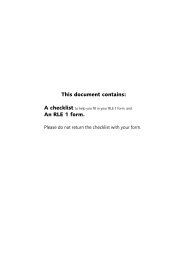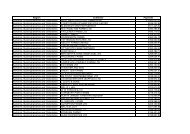RPA Business Plan 2012-13 final .pdf - The Rural Payments Agency ...
RPA Business Plan 2012-13 final .pdf - The Rural Payments Agency ...
RPA Business Plan 2012-13 final .pdf - The Rural Payments Agency ...
You also want an ePaper? Increase the reach of your titles
YUMPU automatically turns print PDFs into web optimized ePapers that Google loves.
<strong>Rural</strong> <strong>Payments</strong> <strong>Agency</strong><br />
<strong>Business</strong> <strong>Plan</strong><br />
<strong>2012</strong>/<strong>13</strong>
Contents<br />
Foreword by the Chief Executive Officer 2<br />
Executive summary 3<br />
Our purpose 5<br />
Our strategic goals and priorities 5<br />
Improving our performance for our customers and the taxpayer in <strong>2012</strong>/<strong>13</strong> 5<br />
Improving our future: Year one of our Five Year <strong>Plan</strong>:<br />
What will we deliver in <strong>2012</strong>/<strong>13</strong> 7<br />
Our stakeholders 9<br />
Governance 9<br />
Risk management 9<br />
Better regulation 10<br />
Big society and localism 11<br />
Joint working and service delivery reform 12<br />
Sustainable development <strong>13</strong><br />
Annex A – Financial information 14<br />
Annex B – Governance 18<br />
Annex C – Overview of <strong>RPA</strong> governance structure 20<br />
Annex D – Potential new activity 21<br />
Annex E – How to contact us 22
Foreword by the Chief Executive Officer<br />
I am delighted to be presenting the <strong>Rural</strong> <strong>Payments</strong> <strong>Agency</strong>’s (<strong>RPA</strong>) first comprehensive annual<br />
<strong>Business</strong> <strong>Plan</strong> since I joined as Chief Executive Officer. This <strong>Business</strong> <strong>Plan</strong> covers the first year of our<br />
strategic Five Year <strong>Plan</strong> 1 , which we published in February <strong>2012</strong>.<br />
<strong>RPA</strong> has made steady progress over the last year. We have improved our governance structure<br />
and appointed an entirely new Executive Team, all of whom are permanent civil servants. We have<br />
made more Single Payment Scheme payments to more customers, more quickly than in any previous<br />
year of the scheme, while maintaining a focus on quality and accuracy.<br />
Nevertheless, we face a significant amount of change over the next few years. This is largely linked to<br />
the reform of the Common Agricultural Policy (CAP) due in 2014 or later. We will need to be in the right<br />
state to realise these changes and our Five Year <strong>Plan</strong> sets out how we are preparing for them.<br />
Over the year covered by this <strong>Business</strong> <strong>Plan</strong>, we will be kick-starting our Five Year <strong>Plan</strong>. <strong>The</strong> first stage<br />
is to continue stabilising the agency to put ourselves in the best possible position to implement the<br />
CAP reform changes. We must keep in mind our twin objectives; delivering for our customers; and<br />
offering best value for money for the taxpayer.<br />
We have a lot to deliver this year. We will succeed through the determination of our people to deliver<br />
for our customers, and with the support of our parent department, the Department for Environment,<br />
Food and <strong>Rural</strong> Affairs (Defra).<br />
Mark Grimshaw<br />
Chief Executive Officer<br />
1 rpa.defra.gov.uk/rpa/index.nsf/0/84B1E4D7F43C05408025799D003AC991<br />
2
Executive Summary<br />
<strong>RPA</strong>’s purpose<br />
A. <strong>RPA</strong>’s main tasks are to make Common Agricultural Policy (CAP) support payments, record<br />
livestock movements, carry out inspections and assure management and administration of<br />
CAP schemes at Natural England and the Forestry Commission. We manage more than<br />
40 schemes, paying farmers and traders more than £2 billion each year. Our customers rely<br />
on us to pay them the money they are entitled to.<br />
Our strategic goals and priorities<br />
B. In February <strong>2012</strong>, we launched our Five Year <strong>Plan</strong> setting out our strategic goals and priorities<br />
between <strong>2012</strong> and 2017. <strong>The</strong> <strong>2012</strong>/<strong>13</strong> <strong>Business</strong> <strong>Plan</strong> sets out in more detail what we will deliver<br />
in year one of our Five Year <strong>Plan</strong>.<br />
Improving our performance for our customers in <strong>2012</strong>/<strong>13</strong><br />
C. In relation to the 2011 Single Payment Scheme, we have reported our best ever performance,<br />
exceeding our December 2011 and March <strong>2012</strong> performance indicators for payments to<br />
customers. <strong>The</strong> indicators across all our business for <strong>2012</strong>/<strong>13</strong> aim to build on that to deliver more<br />
effectively to our customers. It is particularly worth highlighting the agency’s commitment to pay<br />
91% of SPS customers and 84% of SPS payments by value, by the end of December <strong>2012</strong>. <strong>The</strong>se<br />
indicators are supported by commitments we made to our customers through our Customer<br />
Charter.<br />
Improving our future: Year one of our Five Year <strong>Plan</strong>:<br />
What we will deliver in <strong>2012</strong>/<strong>13</strong><br />
D. Our Five Year <strong>Plan</strong> delivers in two main phases: the Strategic Improvement <strong>Plan</strong>, which stabilises<br />
the agency in preparation for CAP reform; and the Future Options Programme which will deliver<br />
the new CAP schemes. <strong>2012</strong>/<strong>13</strong> will be the first year of the Five Year <strong>Plan</strong>, during which we will<br />
be starting our Future Options Programme procurement process and beginning to implement our<br />
Strategic Improvement <strong>Plan</strong>. <strong>The</strong>re are six main themes to the Strategic Improvement <strong>Plan</strong> within<br />
which we will deliver improvements in <strong>2012</strong>/<strong>13</strong>:<br />
• Cleansed data.<br />
• Improved processes and controls.<br />
• Maintained or improved technology.<br />
• Fit for purpose structure and corporate services.<br />
• Better customer service tools.<br />
• Improved people capability and capacity.<br />
Our stakeholders<br />
E. We work closely with our stakeholders, which is essential to ensure we deliver the best possible<br />
services for our customers now, and that our Future Options Programme will deliver fit for<br />
purpose services for them in the future.<br />
Governance<br />
F. Since our last <strong>Business</strong> <strong>Plan</strong>, we have better defined our governance structure internally and in<br />
relation to Defra. Key to this are the non‐executives who are now part of the agency’s governance<br />
to provide scrutiny and challenge. This governance and the associated enhancement in<br />
decision-making will help us deliver improvements this year and help drive our Five Year <strong>Plan</strong>.<br />
3
Risk management<br />
G. We are actively looking to improve our risk management as we enter a period of substantial<br />
change around the delivery of our Five Year <strong>Plan</strong>. <strong>The</strong> Executive Team takes the lead in the<br />
majority of direct risk management activities to control individual risks on the agency’s risk<br />
register. <strong>The</strong> <strong>Agency</strong> Management Board and Oversight Board also provide insight and challenge.<br />
<strong>The</strong> Audit and Risk Committee provides assurance to the <strong>Agency</strong> Management Board that risk<br />
management is effective within the agency.<br />
Better regulation<br />
H. Most of <strong>RPA</strong>’s work is laid down by European legislation. <strong>The</strong>refore, rather than look for<br />
alternatives to legislation, the most achievable way for us to deliver better regulation is to make<br />
sure that we implement legislation as appropriately as possible.<br />
I. We are looking to implement the relevant recommendations of the Farming Regulation Task<br />
Force; improving our guidance; participating in the Red Tape Challenge; and developing a<br />
proportionate approach to CAP reform.<br />
Big society and localism<br />
J. <strong>RPA</strong> collaborates with a wide range of national and regional organisations to deliver efficient<br />
and customer-focused payment of farm support in England. We have also established the<br />
<strong>RPA</strong> Farmer Panel, which we use to research independent views and insight from up to<br />
1,000 farmers. <strong>The</strong> agency is a national employer with a strong regional presence.<br />
Joint working and service delivery reform<br />
K. Joint working is also at the heart of <strong>RPA</strong>’s work. As a paying agency we have responsibilities<br />
beyond our immediate organisational boundaries. With Defra, we are focused on joining up<br />
the customer experience so that it feels seamless no matter which part of the department our<br />
customers are dealing with.<br />
L. As part of our Future Options Programme we are currently exploring a much greater degree of<br />
partnering (with other parts of Defra, other government departments, industry, third parties) and<br />
we are also considering different ways to deliver our business.<br />
M. <strong>RPA</strong> is driving the use of electronic communications and services, in line with the Government’s<br />
‘digital by default’ approach. We are working with Defra in preparing for the new Single<br />
Government Website which is looking to simplify and improve online services. We are continuing<br />
to deliver and improve our SPS Online application service.<br />
Sustainable development<br />
N. <strong>The</strong> vast majority of <strong>RPA</strong>’s impact on the environment stems from the ‘greenhouse gas’ emissions<br />
we produce as a result of occupying our buildings. Last year we exceeded the Prime Minister’s<br />
target of a 10% reduction in energy consumption. In 2009/10 we produced 5,002 tonnes of<br />
greenhouse gas emissions from our buildings and we are working to reduce our annual output to<br />
less than 4,200 tonnes of these emissions. <strong>RPA</strong>’s occupational footprint has also declined as we<br />
have closed a number of smaller offices this year. We hope to continue in this positive direction<br />
during <strong>2012</strong>/<strong>13</strong>.<br />
O. We have also made significant progress in reducing our waste, but the one area where we have<br />
not seen such a significant fall is in water consumption, where we have remained broadly static.<br />
This is an area we need to focus on in the year ahead.<br />
4
Our purpose<br />
1. <strong>RPA</strong>’s main tasks are to make CAP support payments, record livestock movements, carry out<br />
inspections and assure management and administration of CAP schemes at Natural England<br />
and the Forestry Commission. We manage more than 40 schemes, paying farmers and traders<br />
more than £2 billion each year. To administer such a wide range of schemes and meet European<br />
Union (EU) requirements we manage information on more than two million land parcels and<br />
thirteen million cattle movements, and hold the personal data, including SPS entitlements data,<br />
of 120,000 customers. Our customers rely on us to pay them the money they are entitled to.<br />
Our work supports Defra’s Structural Reform <strong>Plan</strong>, particularly in the key area of supporting<br />
British farming and encouraging sustainable food production. Our data and processes also<br />
support delivery of the ‘Pillar 2’ CAP schemes (agri‐environment schemes and other<br />
non-direct payments) by other parts of the Defra network.<br />
Our strategic goals and priorities<br />
2. In February <strong>2012</strong>, we launched our Five Year <strong>Plan</strong> setting out our strategic goals and priorities<br />
between <strong>2012</strong> and 2017. It sets out how we will deliver a better service to our customers, pay<br />
them the right amount of money on time, make the agency more effective and efficient and<br />
enhance our support of the rural economy. <strong>The</strong> Five Year <strong>Plan</strong> aims to overcome the legacy issues<br />
of inaccuracy, poor timeliness and failing to deliver value for money. It also contributes to the<br />
government’s overall objective to support and develop British farming and encourage sustainable<br />
food production.<br />
3. Our three core objectives over the next five years are:<br />
• To stabilise <strong>RPA</strong>. This will enable us to deliver all our schemes in the remaining CAP period;<br />
in line with value for money principles; to achieve acceptable payment accuracy; and to<br />
draw a line under legacy issues in order to remove the accounts qualifications.<br />
• To develop the specifications and procure the replacement systems that meet the<br />
CAP 20<strong>13</strong> obligations and avoid the errors which stemmed from the introduction of CAP<br />
2005.<br />
• To implement these new systems at best value for money for the taxpayer, without<br />
customer service issues or unexpected costs.<br />
4. <strong>The</strong> <strong>2012</strong>/<strong>13</strong> <strong>Business</strong> <strong>Plan</strong> sets out in more detail what we will deliver in year one of our<br />
Five Year <strong>Plan</strong>.<br />
Improving our performance for our<br />
customers and the taxpayer in <strong>2012</strong>/<strong>13</strong><br />
5. In relation to the 2011 Single Payment Scheme, we have reported our best ever performance,<br />
exceeding our December 2011 and March <strong>2012</strong> performance indicators for payments to<br />
customers. <strong>The</strong> indicators across all our business for <strong>2012</strong>/<strong>13</strong> aim to build on that, to deliver more<br />
effectively to our customers. It is particularly worth highlighting the agency’s commitment to pay<br />
91% of SPS customers and 84% of SPS payments by value, by the end of December <strong>2012</strong>.<br />
5
6. Our full set of headline indicators are:<br />
• Delivering service to our customers –<br />
an average customer satisfaction rate of at least 80% across the year.<br />
• Timely payment of the Single Payment Scheme –<br />
91% of customers and 84% of value by the end of December <strong>2012</strong>.<br />
97% of customers and 97% of value by the end of March 20<strong>13</strong>.<br />
• Timely payment of application for Trader schemes –<br />
95% within 28 calendar days of receipt,<br />
99% within 60 calendar days of receipt.<br />
• Timely payment of applications to <strong>Rural</strong> Development Programme for England schemes –<br />
98% within 5 working days of request.<br />
• Getting it right –<br />
to ensure accurate payments, measured at 98% of the financial value.<br />
• Maintain accurate records of cattle within Great Britain –<br />
record at least 98% of reported births, deaths and movements within 7 working days of<br />
receipt.<br />
7. <strong>The</strong>se are our commitments to our customers, which are supported by commitments made<br />
through our Customer Charter:<br />
• We will return calls within one working day.<br />
• We will reply to letters within 15 working days or let you know when this is not possible.<br />
• We will acknowledge e-mails within 2 working days and reply in full within 15 working days,<br />
or let you know when this is not possible.<br />
• We will update your maps to reflect reported changes within 30 working days, or let you<br />
know when this is not possible.<br />
• We will normally post your requested cattle passports within 5 working days. If you apply<br />
online for your cattle passports, we will normally post them within 3 working days.<br />
• If you need to complain about our service, we will investigate and respond within<br />
15 working days. If this is not possible we will agree a plan to resolve the complaint with you.<br />
8. <strong>The</strong>se are our commitments to our parent department, Defra, and the taxpayer:<br />
• Maintain a focus on costs – we will continue to monitor the delegated budget from Defra<br />
using a range of agreed measures, for example, SPS cost per claim.<br />
• Minimise the risk of disallowance by a) having clear evidence to show activities to address<br />
specific audit recommendations, and b) development of a tool to better understand the<br />
impact of each audit recommendation.<br />
• Support the digital by default agenda by continuing to encourage our customers to use<br />
the electronic process for making applications to SPS, where we expect at least a third of<br />
applications to be made via this route.<br />
• We will continue validating identified over and under payments, raising invoices or releasing<br />
payments as appropriate and ensuring that the agency’s accounts reflect the up-to-date<br />
position. Alongside that, we will, by the end of June <strong>2012</strong>, present the Oversight Board with<br />
an assessment of the impact of this work on the issues giving rise to the qualification of the<br />
agency’s 2010/11 accounts and options for any additional activity necessary to address these.<br />
• We will complete all SPS <strong>2012</strong> related inspections by 31 December <strong>2012</strong>.<br />
• We will introduce an internal Quality Assurance Team that will quality assure<br />
the work of our people.<br />
6
Improving our future<br />
Year one of our Five Year <strong>Plan</strong><br />
What we will deliver in <strong>2012</strong>/<strong>13</strong><br />
9. Our Five Year <strong>Plan</strong> delivers in two main phases: the Strategic Improvement <strong>Plan</strong>, which stabilises<br />
the agency in preparation for CAP reform; and the Future Options Programme which will deliver<br />
the new CAP schemes. <strong>2012</strong>/<strong>13</strong> will be the first year of the Five Year <strong>Plan</strong>, during which we will<br />
be starting our Future Options Programme procurement process and beginning to implement our<br />
Strategic Improvement <strong>Plan</strong>. <strong>The</strong>re are six main themes to the Strategic Improvement <strong>Plan</strong> which<br />
we detail below, along with what we will deliver in <strong>2012</strong>/<strong>13</strong>:<br />
Cleansed data<br />
10. For this theme we will:<br />
• develop and start to implement new processes to improve the accuracy of land data used to<br />
underpin SPS and key rural development schemes. We will start to proactively use satellite<br />
imagery, aerial photography and Ordnance Survey data;<br />
• continue to improve the process for entitlement transfers and corrections, and develop and<br />
populate an entitlements database that will support base information for the Future Options<br />
Programme;<br />
• identify issues in the quality and structure of our customer data; and start to improve the data,<br />
which we will use to improve engagement with our customers;<br />
• create a risk based approach to identifying, checking and where appropriate correcting the<br />
credit or debit position on customer accounts containing historic inaccuracies;<br />
• cleanse a large proportion of our Accounts Payable and Accounts Receivable ledgers to<br />
remove inaccuracies and anomalies; and<br />
• improve the interface between our SPS claim calculation and finance systems, reducing the<br />
need to check customer payments.<br />
Improved processes and controls<br />
11. During the year we will:<br />
• improve the quality of the service we offer to our SPS customers with complex cases, and the<br />
service we offer to agents acting on behalf of customers;<br />
• review and optimise key business processes to improve performance, consistency and drive<br />
down cost;<br />
• improve the consistency of our services by introducing standard online guidance for our case<br />
workers;<br />
• define and establish a key control framework for each scheme that will make sure we minimise<br />
the risk of disallowance;<br />
• create a Quality Assurance Team to monitor compliance with our key processes and controls,<br />
identifying improvement opportunities; and<br />
• enhance management information and analytical capability to drive performance<br />
improvements.<br />
7
Maintained or improved technology<br />
12. Over the year we will:<br />
• investigate the potential for closing previous scheme years to prevent unnecessary re-work;<br />
• make SPS <strong>2012</strong> applications available in three formats for our customers (online, computer<br />
farm software and paper);<br />
• enhance the SPS e-channel to improve online application submission and tracking; and<br />
• address vulnerabilities in our current systems and infrastructure to make sure they remain<br />
supportable for the life of the current CAP scheme.<br />
Fit for purpose structure and corporate services<br />
<strong>13</strong>. For this theme we will:<br />
• reorganise our people into a structure that supports a new customer-facing focus for our<br />
operations, and supports a consistent approach to delivering change;<br />
• improve the management of our suppliers to deliver value for money; and<br />
• work with Defra and other government departments to optimise the use of our estate.<br />
Better customer service tools<br />
14. During the year we will:<br />
• improve our process for handling customer complaints and appeals, enabling us to learn<br />
from our mistakes; and<br />
• segment our customer base to allow us to provide tailored information and guidance to<br />
our customers that will help them submit accurate applications.<br />
Improved people capability and capacity<br />
15. Throughout the year we will:<br />
• be able to effectively plan and deploy our people to any priority activity;<br />
• improve leadership at all levels through capability assessments, performance management<br />
and new talent development programmes; and<br />
• improve engagement with our people to drive up professionalism and embed redefined<br />
agency values.<br />
16. We will continue to produce information concerning the agency’s workforce, diversity and<br />
higher level salaries as required by the Government’s Equality and Transparency agendas. We will<br />
continue to build on progress with regard to the diversity of our workforce. We will monitor to<br />
ensure it continues to reflect local and national demographics, and look at increasing the diversity<br />
represented in our senior grades.<br />
8
Our stakeholders<br />
17. Working closely with our stakeholders is essential to ensuring that we deliver the best possible<br />
services for our customers now, and that our Future Options Programme will deliver fit for<br />
purpose services for them in the future.<br />
18. <strong>The</strong> key stakeholders representing our customers include:<br />
• <strong>The</strong> National Farmers’ Union.<br />
• <strong>The</strong> Tenant Farmers’ Association.<br />
• <strong>The</strong> Country Land and <strong>Business</strong> Association.<br />
• <strong>The</strong> Central Association of Agricultural Valuers.<br />
• <strong>The</strong> British Institute of Agricultural Consultants.<br />
• <strong>The</strong> Institute of Agricultural Secretaries and Administrators.<br />
• <strong>The</strong> National Beef Association.<br />
19. We work with our stakeholders and use their expertise to help drive planning and policy and<br />
to aid communication with their members. We are working with them to help develop and<br />
implement CAP 20<strong>13</strong>. <strong>The</strong> <strong>RPA</strong> Farmer Panel described later, is available to the Defra network<br />
and supplies farmers’ views and opinions for practical decision-making when planning policy<br />
development.<br />
Governance<br />
20. Since our last <strong>Business</strong> <strong>Plan</strong>, we have better defined our governance structure internally and<br />
in relation to Defra. Key to this are the non-executives who are now part of the agency’s<br />
governance to provide scrutiny and challenge. This governance and the associated improvement<br />
in decision‐making will help us deliver improvements this year and help drive our Five Year<br />
<strong>Plan</strong>. A new <strong>RPA</strong> Framework Document 2 setting out our governance and responsibilities has<br />
been agreed by the <strong>RPA</strong> Oversight Board and the Minister for Agriculture and Food. It sets out<br />
the overarching framework for the sponsorship of <strong>RPA</strong> and the governance and accountability<br />
arrangements between the Government and the agency.<br />
21. For more detail on governance and a diagram of the main governance relationships within <strong>RPA</strong>,<br />
please read Annexes B and C.<br />
Risk management<br />
22. We are actively looking to improve our risk management as we enter a period of substantial<br />
change to deliver our Five Year <strong>Plan</strong>. <strong>The</strong> Executive Team takes the lead in the majority of<br />
direct risk management activities to control individual risks on the agency’s risk register.<br />
<strong>The</strong> Executive Team conducts an in depth risk review on a quarterly basis. <strong>The</strong> most significant of<br />
these risks are escalated to the <strong>Agency</strong> Management Board which also conducts its risk sessions<br />
every quarter; the <strong>Agency</strong> Management Board provides the strategic level advice and guidance<br />
towards managing these risks and looks for assurance from the Executive Team that they are<br />
being managed effectively.<br />
23. <strong>The</strong> <strong>RPA</strong> Oversight Board periodically overviews the agency’s key risks, and takes a keen interest,<br />
including through reviewing the agency’s risk register.<br />
2 rpa.defra.gov.uk/rpa/index.nsf/UIMenu/6BE1459D1829662080256FDD003715B3Opendocument<br />
9
24. <strong>The</strong> Audit and Risk Committee has also engaged and provided challenge on the agency’s<br />
risk register which to help drive improvements to it. <strong>The</strong> committee provides assurance that<br />
risk management is effective within the agency, partly through evaluation of the outcomes of<br />
risk management.<br />
Better regulation<br />
25. <strong>RPA</strong> is absolutely committed to implementing the EU schemes it runs in as simple a manner<br />
as possible. Many of these schemes are highly prescriptive for paying agencies, with serious<br />
financial consequences for not following the prescribed processes. However, we recognise the<br />
importance of striking the right balance between control and flexibility to make sure that we give<br />
our customers the best opportunity to thrive.<br />
26. Most of <strong>RPA</strong>’s work is laid down by European legislation. <strong>The</strong>refore, rather than look for<br />
alternatives to legislation, the most achievable way for us to deliver better regulation is to make<br />
sure that we implement legislation as appropriately as possible. However, we are always aware<br />
of the need to try different approaches, for example, in exploring how ‘earned recognition’,<br />
suggested by the Farming Regulation Task Force, would work.<br />
Farming Regulation Task Force<br />
27. <strong>RPA</strong> has enthusiastically embraced the recommendations of the Farming Regulation Task Force<br />
Report accepted by the department and, where relevant, the recommendations of the Forestry<br />
Regulation Task Force Report. For example, we have made a commitment that before developing<br />
and launching any new forms or guidance, we will consult closely with our stakeholders, including<br />
individual farmers. This will help to make sure that the language, content and format of our<br />
advice, guidance and other information is helpful, easily understood and correctly applied on<br />
farm.<br />
28. We are also working closely with Defra on a range of measures, including around County Parish<br />
Holding number allocation and livestock movement reporting, which aim to simplify the current<br />
livestock regime, while offering livestock keepers increased flexibility to manage their holding in a<br />
way best suited to their individual needs.<br />
Improved guidance<br />
29. When the European Commission (EC) introduces regulatory changes which relate to our schemes<br />
and services, we must keep farmers and agents informed at the right time. This is critical in<br />
ensuring that farmers are operating within up-to-date guidelines and that we meet our paying<br />
agency obligations to the Commission. We are working to keep any new guidance actively<br />
helpful, to minimise the time needed for farmers to read, understand and apply any regulatory<br />
updates. We must balance the wish to make guidance shorter and simpler with the need to retain<br />
what our customers consider is full and essential information.<br />
30. We have recently produced equality information concerning our customers as required by the<br />
Government’s Equality and Transparency agendas. We will update and monitor this data to<br />
identify the best formats in which to provide our guidance so that customers are not unfairly<br />
disadvantaged as a result of any special requirements they may have. For further information on<br />
the <strong>RPA</strong>’s equality objectives 3 visit our website.<br />
3 rpa.defra.gov.uk/rpa/index.nsf/0/AB50B005B26EA7FD80257990004DFE29<br />
10
Red Tape Challenge<br />
31. We are actively contributing to the Government’s Red Tape Challenge, largely through our<br />
response to the Farm Regulation Task Force, but also through our work on improving the quality<br />
of our data and the customer experience.<br />
CAP Reform<br />
32. We are working very closely with Defra as the UK takes part in negotiations on the next<br />
CAP schemes. We will aim to influence the negotiations to develop schemes that are both<br />
effective and simple for our customers. If successful, this will mean real improvements for our<br />
customers in the next CAP scheme.<br />
Big society and localism<br />
Stakeholder engagement<br />
33. <strong>RPA</strong> collaborates with a wide range of national and regional organisations to deliver efficient and<br />
customer-focused payment of farm support in England. <strong>The</strong>se include a number of stakeholder<br />
organisations representing, and charitable organisations supporting, farmers, agents, consultants<br />
and farm administrators in England. We are often able to use their communication channels to<br />
get information to and seek views from our customers. We also support these organisations in<br />
delivering their own objectives, providing briefing and training events for their staff and members<br />
and taking part in events and seminars on relevant topics, run by them across England.<br />
<strong>RPA</strong> Farmer Panel<br />
34. We have also established the <strong>RPA</strong> Farmer Panel, which we use to research independent<br />
views and insight from up to 1,000 farmers. <strong>The</strong>se volunteers represent a broad range of farm<br />
businesses; from smallholders to large farm enterprises; livestock, arable and mixed producers;<br />
users and non-users of Information Technology; and upland and lowland farmers from across<br />
England.<br />
35. Each piece of research we conduct can use any number of volunteers from this panel. Members<br />
are selected by the research company to ensure that all segments are represented and that<br />
participation is anonymous. Surveys have ranged from 10 to 800 people taking part which has<br />
helped inform the agency on topics such as the SPS application and <strong>Rural</strong> Land Register mapping<br />
updates. Each person on the panel is contacted a maximum of four times then they are replaced.<br />
We make sure that their replacement is from the same farming segment to maintain the levels<br />
represented. We will be using the panel regularly in <strong>2012</strong>/<strong>13</strong> as we develop a more partner-based<br />
approach, especially to drafting guidance for farmers.<br />
Localism<br />
36. <strong>The</strong> agency is a national employer with a strong regional presence. We have offices in Reading,<br />
Carlisle, Exeter, Newcastle upon Tyne, Northallerton and Workington; and have more than<br />
thirty local inspectorate offices. As well as our six main sites, we maintain Drop-in Centres in<br />
several other places, including Crewe, Lincoln, Newmarket and Worcester between March and<br />
June for farmers and agents to deliver SPS application forms.<br />
11
Joint working and service delivery reform<br />
Working with the Defra network<br />
37. Joint working is also at the heart of <strong>RPA</strong>’s work. As a paying agency we have responsibilities<br />
beyond our immediate organisational boundaries. We work extremely closely with core Defra,<br />
Natural England, the Animal Health and Veterinary Laboratories <strong>Agency</strong>, Forestry Commission,<br />
Environment <strong>Agency</strong> and devolved administrations, among others. For example, our <strong>Rural</strong> Land<br />
Register is an asset for the department and we share it with Natural England. As paying agency<br />
we make payments for processes run by other parts of the Defra network. Beyond the Defra<br />
network we also work closely with Ordnance Survey whose products underpin our <strong>Rural</strong> Land<br />
Register.<br />
38. With Defra, we are focused on joining up the customer experience so that it feels seamless no<br />
matter which part of the department our customers are dealing with. Part of the response to the<br />
Farming Regulation Task Force will be examining how we can better join up our guidance across<br />
the Defra network.<br />
39. As part of our Future Options Programme we are currently exploring a much greater degree of<br />
partnering in the future (with other parts of Defra, other government departments, industry,<br />
third parties) and we are also considering different ways to deliver our business.<br />
Digital by default<br />
40. <strong>RPA</strong> is increasingly driving the use of electronic communications and services, in line with the<br />
Government’s ‘digital by default’ approach. We are working with Defra in preparing for the<br />
new Single Government Website which is looking to simplify and improve online services.<br />
41. We are continuing to deliver and improve our CTS Online and SPS Online services. In 2011/12,<br />
we made a number of improvements and will continue these in <strong>2012</strong>/<strong>13</strong> based on customer<br />
feedback and experience. Both services are available to all SPS applicants. We are promoting the<br />
SPS electronic channel service in all our guidance and on our website.<br />
12
Sustainable development<br />
42. <strong>The</strong> vast majority of <strong>RPA</strong>’s impact on the environment stems from the greenhouse gas emissions<br />
we produce as a result of occupying our buildings. In 2009/10 we produced 5,002 tonnes of<br />
greenhouse gas emissions from our buildings. Our Greening Government Commitment target for<br />
2011/12 is to reduce this to 4,527 tonnes. If this trend continues across the rest of the year, we<br />
are on target to meet this figure and indeed, we are working to reduce our annual output to less<br />
than 4,200 tonnes of these emissions. Last year we exceeded the Prime Minister’s target of a<br />
10% fall in energy consumption.<br />
43. We have also made significant progress in reducing our waste, by producing less and recycling<br />
more. Total waste is expected to fall from 618 tonnes in 2009/10 to 365 tonnes in 2011/12.<br />
In 2009/10 we recycled or recovered 74% of our waste and in 2011/12 we expect this figure to<br />
exceed 90%. This is partly because we are making better use of electronic communication and<br />
data storage, and means that we are using less natural resource. We hope to continue in this<br />
positive direction during <strong>2012</strong>/<strong>13</strong>.<br />
44. <strong>The</strong> one area where we have not seen such a significant fall is in water consumption, where we<br />
have remained broadly static. This is an area we need to focus on in the year ahead.<br />
45. <strong>RPA</strong>’s occupational footprint has also declined. We have closed a number of smaller offices this<br />
year and now have the minimum number of offices or call points to cover the country. This again<br />
has reduced our overall environmental footprint. However, we needed to consider that our<br />
travelling officers, particularly our inspectors, have to be in the right locations to carry out their<br />
inspections with minimal environmental impact.<br />
46. <strong>The</strong> agency has again been successful in meeting the requirements of the Environmental<br />
Management System International Organisation for Standardisation (ISO) ISO 14001:2004 at<br />
all of our main sites.<br />
<strong>13</strong>
Annex A<br />
Financial information<br />
Table 1: <strong>2012</strong>/<strong>13</strong> Budget allocations<br />
Admin £000<br />
Pay A 36,789<br />
Consultancy B 729<br />
Estates and Accommodation B 12,438<br />
Information Technology (IT) B 46,079<br />
Office Services B 3,841<br />
Travel and Subsistence (T&S) B 1,622<br />
Other Non–Pay B 7,661<br />
Temporary Employees B 282<br />
Advertising and Marketing B 115<br />
Depreciation B 20,758<br />
Non–Pay Total B 93,525<br />
Defra Core Income C (700)<br />
External Income C (17)<br />
Total Income Total C (717)<br />
Grand Total 129,597<br />
Programme<br />
Programme Running Cost IT D 6,047<br />
Programme Running Cost Pay D 43,786<br />
Programme Income D (1,003)<br />
Programme Strategic Improvement <strong>Plan</strong> costs D 2,500<br />
Programme Estates D 75<br />
Programme Office Services D 309<br />
Programme T&S D 1,771<br />
Programme Other Costs D 1,420<br />
Programme Advertising D 5<br />
Programme Scheme Costs D 5,300<br />
Total D 60,210<br />
Total Resource Departmental Expenditure Limit (DEL) 189,807<br />
Capital<br />
Project A: Strategic Improvement <strong>Plan</strong> 1,800<br />
Total Capital Departmental Expenditure Limit (CDEL) 1,800<br />
Total DEL 191,607<br />
Total Annual Managed Expenditure (AME) 1,151<br />
14
Table 2: <strong>2012</strong>/<strong>13</strong> Activity based budgets<br />
Key activities<br />
Admin<br />
Pay<br />
£000<br />
Departmental Expenditure Limit<br />
Admin<br />
Non-Pay<br />
Admin<br />
Income<br />
Annually<br />
Managed<br />
Expenditure<br />
Programme Capital Programme<br />
External Relations 3,064 1,338 - - - -<br />
Customer 3,424 630 - - - -<br />
Design and Change 5,182 8,835 - - - -<br />
Information Technology 4,330 22,427 - 5,260 - -<br />
Human Resources 3,112 2,406 - - - -<br />
<strong>Plan</strong>ning and Performance 4,642 629 - - - -<br />
Operations - - - 47,150 - -<br />
Finance, Assurance and<br />
Commercials<br />
10,125 4,3<strong>13</strong> - - - -<br />
Internal Audit 845 163 - - - -<br />
Strategic Improvement<br />
<strong>Plan</strong>/Future Options<br />
- 17,500 - 2,500 1,800 -<br />
Programme<br />
Centrally Managed Costs 2,065 34,567 - 5,300 - 1,151<br />
Total 36,789 92,808 - 60,210 1,800 1,151<br />
Table 3a: Indicative Spending Review allocations<br />
2011/12<br />
Forecast<br />
Outturn<br />
<strong>2012</strong>/<strong>13</strong><br />
Budget<br />
£000<br />
20<strong>13</strong>/14<br />
Indicative<br />
Allocation<br />
2014/15<br />
Indicative<br />
Allocation<br />
Admin<br />
Pay 27,780 36,789 - -<br />
Departmental Non-Pay 55,870 92,808 - -<br />
Expenditure Income (20) - - -<br />
Limit (DEL)<br />
Total 83,630 129,597 111,796 100,616<br />
Programme DEL Programme Expenditure –<br />
Running Costs<br />
78,660 54,910 - -<br />
Programme Expenditure –<br />
Scheme<br />
19,100 5,300 - -<br />
Programme – Income (100) - - -<br />
Total 97,660 60,210 56,110 50,110<br />
Total Resource DEL 181,290 189,807 167,906 150,726<br />
Capital DEL 2,300 1,800 - -<br />
Grand Total 183,590 191,607 167,906 150,726<br />
15
Table 3b: Indicative requirement<br />
Indicative total Departmental Expenditure<br />
Limit (DEL) requirement*<br />
2011/12<br />
Forecast<br />
Outturn<br />
<strong>2012</strong>/<strong>13</strong><br />
Budget<br />
£000<br />
20<strong>13</strong>/14<br />
Indicative<br />
Allocation<br />
2014/15<br />
Indicative<br />
Allocation<br />
183,590 191,607 188,252 182,522<br />
*Indicative requirement for 20<strong>13</strong>/14 and 2014/15 is above the current indicative SR allocation. <strong>The</strong> <strong>Agency</strong> has presented this position to Defra’s Central Approvals Panel<br />
(December 2011).<br />
Table 4: Employee levels<br />
2011/12 <strong>2012</strong>/<strong>13</strong> 20<strong>13</strong>/14 2014/15<br />
Admin Prog Admin Prog Admin Prog Admin Prog<br />
Permanent Employees 736.4 1,668.9 842.1 1,574.0 776.0 1,574.0 771.5 1,574.0<br />
Consultants 10.1 4.0 5.6 - 2.0 - 2.0 -<br />
Temporary Employees 27.3 - 9.3 - 21.0 5.0 21.0 5.0<br />
Total 773.8 1,672.9 857.0 1,574.0 799.0 1,579.0 794.5 1,579.0<br />
Permanent people<br />
movement from<br />
previous year<br />
- - (105.7) 94.9 66.1 - 4.5 -<br />
Table 5: Forecast balance sheet<br />
£000<br />
Statement of Financial Position 2010/11<br />
Forecast 31/12/2011<br />
2011/12<br />
Property, <strong>Plan</strong>t and Equipment 6,797 5,100<br />
Other non-current Assets 56,603 38,000<br />
Total non-current Assets 63,400 43,100<br />
Stock 27,755 17,700<br />
Trade and other receivables 509,269 424,000<br />
Derivative asset 635 600<br />
Cash and cash equivalents 220,481 220,000<br />
Total current assets 758,140 662,300<br />
Current Liabilities (398,378) (234,700)<br />
Non-current liabilities - -<br />
Other liabilities (118,624) (112,600)<br />
Provisions (2,697) (3,000)<br />
Assets less liabilities 301,841 355,100<br />
General fund 301,429 350,000<br />
Cash Flow Hedge Reserve (3,362) 3,000<br />
Revaluation reserve 3,774 2,100<br />
Total taxpayers’ equity 301,841 355,100<br />
16
Table 6: Common areas of spend<br />
<strong>The</strong>me Measure 2011/12<br />
Estate Costs Total office estate (sqm) 35,721<br />
Total cost of office estate (£m) 12.2<br />
Cost per FTE (£) 4,661<br />
Cost per sqm (£) 342<br />
Procurement Total procurement spend (£m) 67<br />
Energy Average price of energy (£/kwh) 0.09<br />
IT Total third party ICT costs (£m) 22.6<br />
Cost of desktop provision per headcount (£) 3,800<br />
Corporate Service Cost Human Resources (£m) 5,518<br />
Finance (£m) 14,438<br />
Procurement (£m)<br />
Included in Finance<br />
Legal (£m) 1,000<br />
Communications (£m) 4,054<br />
Back office costs as a percentage of overall costs (%) 68.28 4<br />
People Average people costs (£) 30,500<br />
Number of recruitment exceptions 76<br />
4 This represents the <strong>RPA</strong>’s Admin budget, which is the agency’s total budget minus only our Operations Directorate and specific IT support costs (Programme costs).<br />
17
Annex B<br />
Governance<br />
Roles of key individuals<br />
47. Defra’s Secretary of State is ultimately accountable for the policies, decisions and actions of the<br />
department and its arm’s length bodies; but for <strong>RPA</strong>, responsibility has been devolved to the<br />
Minister of State for Agriculture and Food.<br />
48. Defra’s Permanent Secretary, as Principal Accounting Officer, is the principal adviser to the<br />
Secretary of State on matters affecting Defra as a whole. As Principal Accounting Officer the<br />
Permanent Secretary appoints <strong>RPA</strong>’s Chief Executive.<br />
49. <strong>The</strong> Chief Executive is designated as the agency’s Accounting Officer by the Principal Accounting<br />
Officer, and must be satisfied that the agency has adequate risk management, financial systems<br />
and procedures in place to promote the efficient and economical conduct of its business,<br />
safeguard financial propriety and regularity, safeguard its reputation, and ensure business<br />
continuity.<br />
Principal governance meetings<br />
50. <strong>The</strong> Oversight Board is chaired by the Minister of State for Agriculture and Food and additionally<br />
comprises senior executives (from within Defra and the agency) and four non-executive directors.<br />
Two of the non‐executive directors are the respective chairs of the <strong>Agency</strong> Management Board<br />
and the Audit and Risk Committee and the others are Defra non-executive directors. <strong>The</strong> purpose<br />
of the Oversight Board is to form part of the collective strategic and corporate leadership of the<br />
agency, bringing together ministerial and Civil Service leaders with non‐executives from outside<br />
Government. Its remit is performance and delivery, including appropriate oversight.<br />
51. <strong>The</strong> <strong>Agency</strong> Management Board brings together the Chief Executive Officer, nominated <strong>RPA</strong><br />
executive directors and non‐executive directors. <strong>The</strong> Defra Corporate Customer is also a member<br />
of the board. <strong>The</strong> <strong>Agency</strong> Management Board has responsibility for setting the agency’s strategic<br />
direction and making strategic choices. It takes responsibility for the agency’s performance and<br />
agrees the issues that should be escalated to Defra and the Oversight Board. It is chaired by a<br />
non-executive director. <strong>The</strong> chair and Chief Executive Officer work closely to ensure that the<br />
<strong>Agency</strong> Management Board effectively supports and challenges the agency’s Executive Team.<br />
52. <strong>The</strong> role of <strong>RPA</strong>’s non-executive directors is to advise, support and challenge the Executive Team<br />
by bringing in experience and expertise from different areas, including the private sector.<br />
53. <strong>The</strong> Audit and Risk Committee is formed of non-executive directors, some of whom also sit on the<br />
<strong>Agency</strong> Management Board. It is responsible for advising both the <strong>Agency</strong> Management Board<br />
and the Chief Executive Officer (as Accounting Officer) on matters relating to risk, control and<br />
governance.<br />
54. <strong>The</strong> Executive Team is the primary tactical decision making group and brings together all<br />
the agency’s executive directors. Its members also have key roles across the range of other<br />
governance activity which ensures consistency on the quality and appropriateness of where<br />
decisions are made.<br />
18
55. <strong>The</strong> Disallowance and Accreditation Committee is responsible for providing advice to the<br />
Executive Team and Accounting Officer on matters relating to disallowance by the EU and to<br />
<strong>RPA</strong>’s accreditation as an EU Paying <strong>Agency</strong>.<br />
56. <strong>The</strong> principal governance meetings outlined above are also supported by a number of additional<br />
groups covering specific elements of the agency’s operation. <strong>The</strong>se have central roles in the<br />
management of some of the key risks associated with the <strong>RPA</strong>. <strong>The</strong>se meetings are shown in<br />
Annex C.<br />
Relationship between <strong>RPA</strong> and Defra<br />
57. <strong>The</strong> Permanent Secretary has nominated a Corporate Owner, who is a member of the<br />
Defra Management Committee, to act on their behalf on day-to-day issues and generate the<br />
close contact needed between Defra and the agency. Specifically, the Corporate Owner supports<br />
the Minister in making sure that the Oversight Board does its job rigorously.<br />
58. <strong>The</strong> Corporate Owner, on behalf of the Permanent Secretary, has appointed a Corporate<br />
Customer from within the senior management team. <strong>The</strong> role of the Corporate Customer is to<br />
provide a high level interface with the agency on all matters relating to the overall delivery and<br />
quality of services provided. <strong>The</strong>y support the Minister and the Corporate Owner in making sure<br />
that Defra’s and other agencies’ requirements of <strong>RPA</strong> are being met.<br />
59. Within the department, Defra’s <strong>RPA</strong> Customer Policy Team has the day-to-day lead in advising<br />
the Minister, Corporate Owner and Corporate Customer on their responsibilities in relation<br />
to the agency. This involves balancing a range of interests that Defra, and Government more<br />
broadly, has in the organisation. <strong>The</strong> <strong>RPA</strong>’s Customer Policy Team acts as the main Defra interface<br />
to the agency. In discharging its role, Defra’s <strong>RPA</strong> Customer Policy Team works closely with<br />
the Executive Team, the Oversight Board (on which it is represented and holds the secretariat<br />
function) and other key stakeholders. <strong>The</strong> <strong>RPA</strong>’s Customer Policy Team reports to the Corporate<br />
Customer.<br />
Internal control<br />
60. <strong>The</strong> system of internal control is designed to manage risk to a reasonable level rather than to<br />
eliminate all risk of failure to achieve policies, aims and objectives. It is based on an ongoing<br />
process designed to identify and prioritise the risks to the achievement of departmental policies,<br />
aims and objectives, to evaluate the likelihood of those risks being realised and the impact should<br />
they be realised, and to manage them efficiently, effectively and economically.<br />
61. <strong>The</strong> Governance Statement was introduced in April 2011 as part of the revised Corporate<br />
Governance Code. It describes how our internal governance, risk arrangements and system<br />
of internal controls work. <strong>The</strong> <strong>Agency</strong> Management Board oversees the maintenance of this<br />
statement and all executive directors supply an annual assurance statement giving an honest<br />
description of how effectively controls are being applied within the agency.<br />
19
Annex C<br />
Overview of <strong>RPA</strong> governance structure<br />
<strong>RPA</strong> Governance Overview<br />
20
Annex D<br />
Potential new activity<br />
62. <strong>The</strong> department has made <strong>RPA</strong> aware of a number of areas of potential new activity for this<br />
year. When the requirements become clearer, we will work with Defra to determine and agree<br />
what needs to be done and the best way to implement it, taking account of the fact that some<br />
activities will require new resources (which may have to be found by stopping existing activities).<br />
<strong>The</strong>se areas include:<br />
• <strong>The</strong> new EU Dairy Package is likely to have some impacts on <strong>RPA</strong> and our customers.<br />
We are presently working closely with Defra to prepare to analyse the detailed regulations<br />
due in <strong>2012</strong>, and establish the scale and nature of the changes.<br />
• Negotiations regarding the introduction of European legislation on the electronic identification<br />
of cattle are ongoing, and may require <strong>RPA</strong> to make changes to British Cattle Movement<br />
Service (BCMS).<br />
• We will be looking at those producers who are currently suspended from the Fruit and<br />
Vegetable Producer Organisation Scheme to establish whether we can lift their suspensions<br />
or have to derecognise them.<br />
• We are analysing our duties under the inspection regime for olive oil which may result in<br />
changes to our activities.<br />
21
Annex E<br />
How to contact us<br />
Our offices<br />
Our main mailing address:<br />
<strong>Rural</strong> <strong>Payments</strong> <strong>Agency</strong><br />
PO Box 300<br />
Sheffield<br />
S95 1AA<br />
Reading<br />
North Gate House<br />
21-23 Valpy Street<br />
Reading<br />
RG1 1AF<br />
Newcastle<br />
Lancaster House<br />
Hampshire Court<br />
Newcastle <strong>Business</strong> Park<br />
Newcastle upon Tyne<br />
NE4 7YH<br />
Northallerton<br />
Alverton Court<br />
Crosby Road<br />
Northallerton<br />
DL6 1AD<br />
Carlisle<br />
Eden Bridge House<br />
Lowther Street<br />
Carlisle<br />
CA3 8DX<br />
Exeter<br />
Clyst House<br />
Winslade Park<br />
Clyst St Mary<br />
Exeter<br />
EX5 1DY<br />
Workington (incl BCMS)<br />
Curwen Road<br />
Workington<br />
CA14 2DD<br />
Helpline numbers<br />
• <strong>RPA</strong> helpline: 0845 603 7777<br />
• BCMS helpline: 0845 050 1234<br />
• BCMS Welsh language helpline: 0845 050 3456<br />
Text Relay (previously known as Type Talk) is a telephone relay service which enables deaf, deafblind,<br />
deafened, hard of hearing and speech impaired people to communicate with hearing people by<br />
telephone. It is run by the Royal National Institute for Deaf People (RNID).<br />
To contact us using Text Relay, dial 18001 followed by the full telephone number from your text phone.<br />
Our website: rpa.defra.gov.uk<br />
22<br />
rpa167 v 1.0 jun <strong>2012</strong>
pa167 - <strong>RPA</strong> <strong>Business</strong> <strong>Plan</strong><br />
Front cover photo - Cotswolds, England<br />
Version 1.0<br />
May <strong>2012</strong><br />
© Crown copyright <strong>2012</strong><br />
Produced by the <strong>Rural</strong> <strong>Payments</strong> <strong>Agency</strong><br />
rpa.defra.gov.uk


